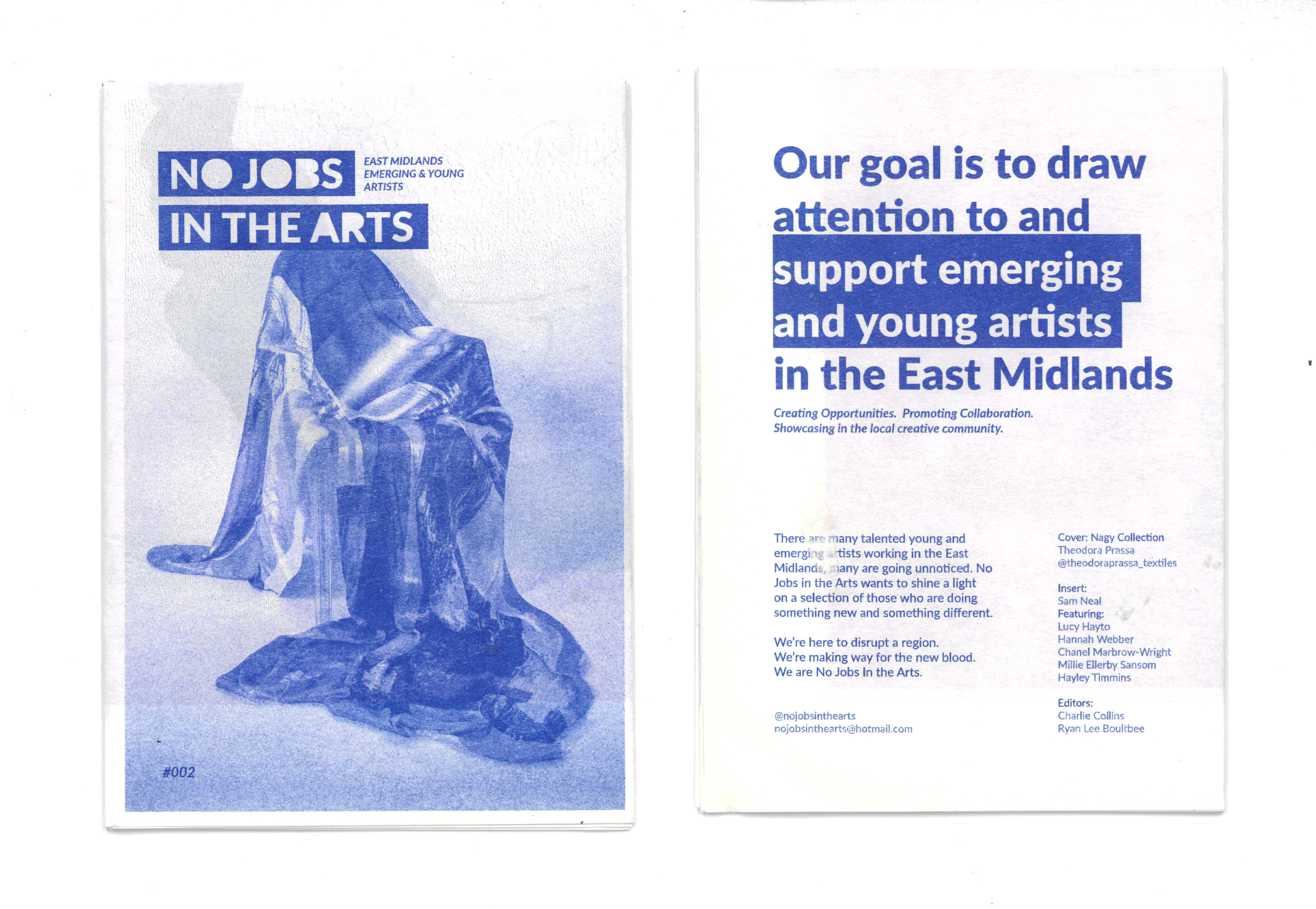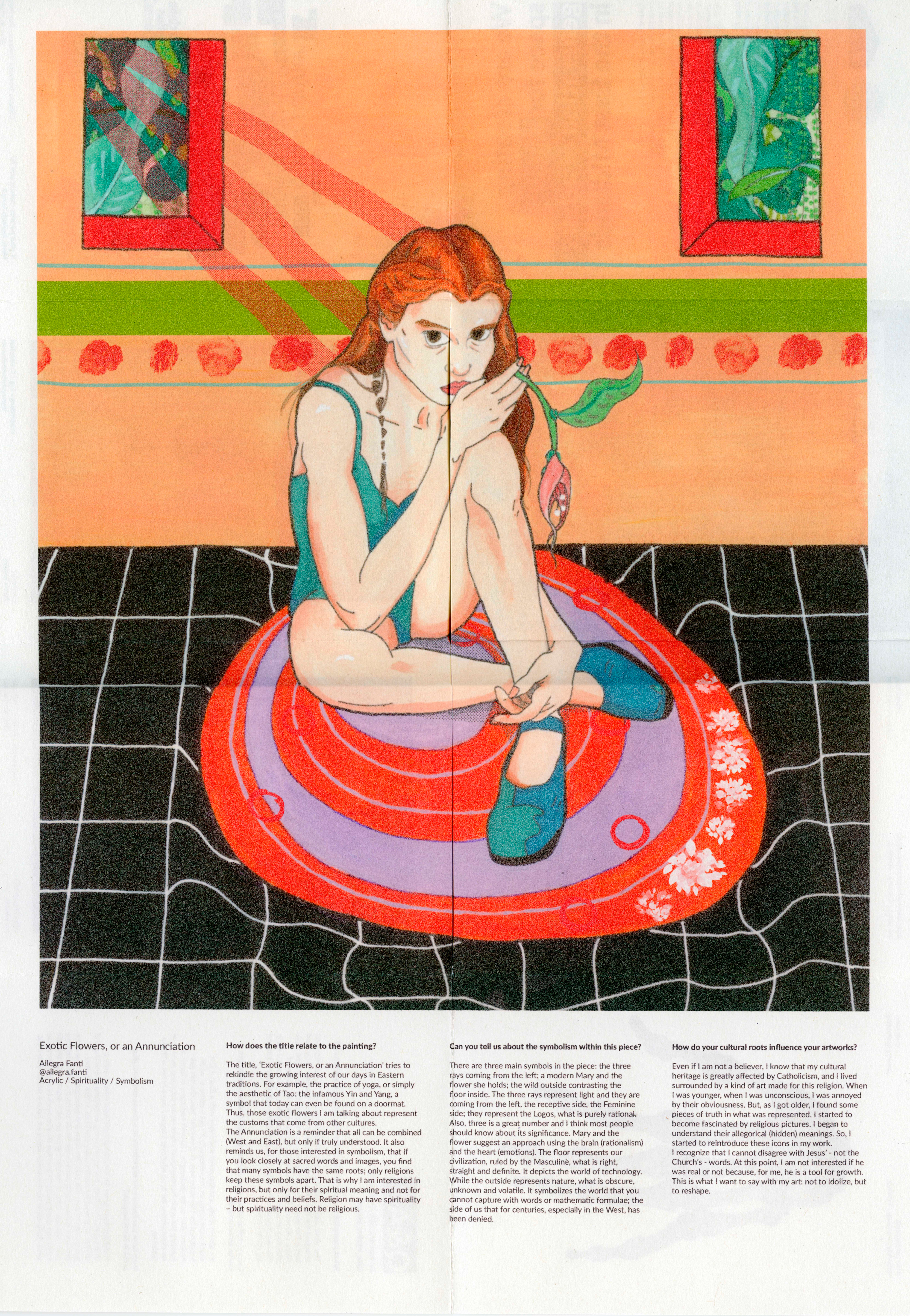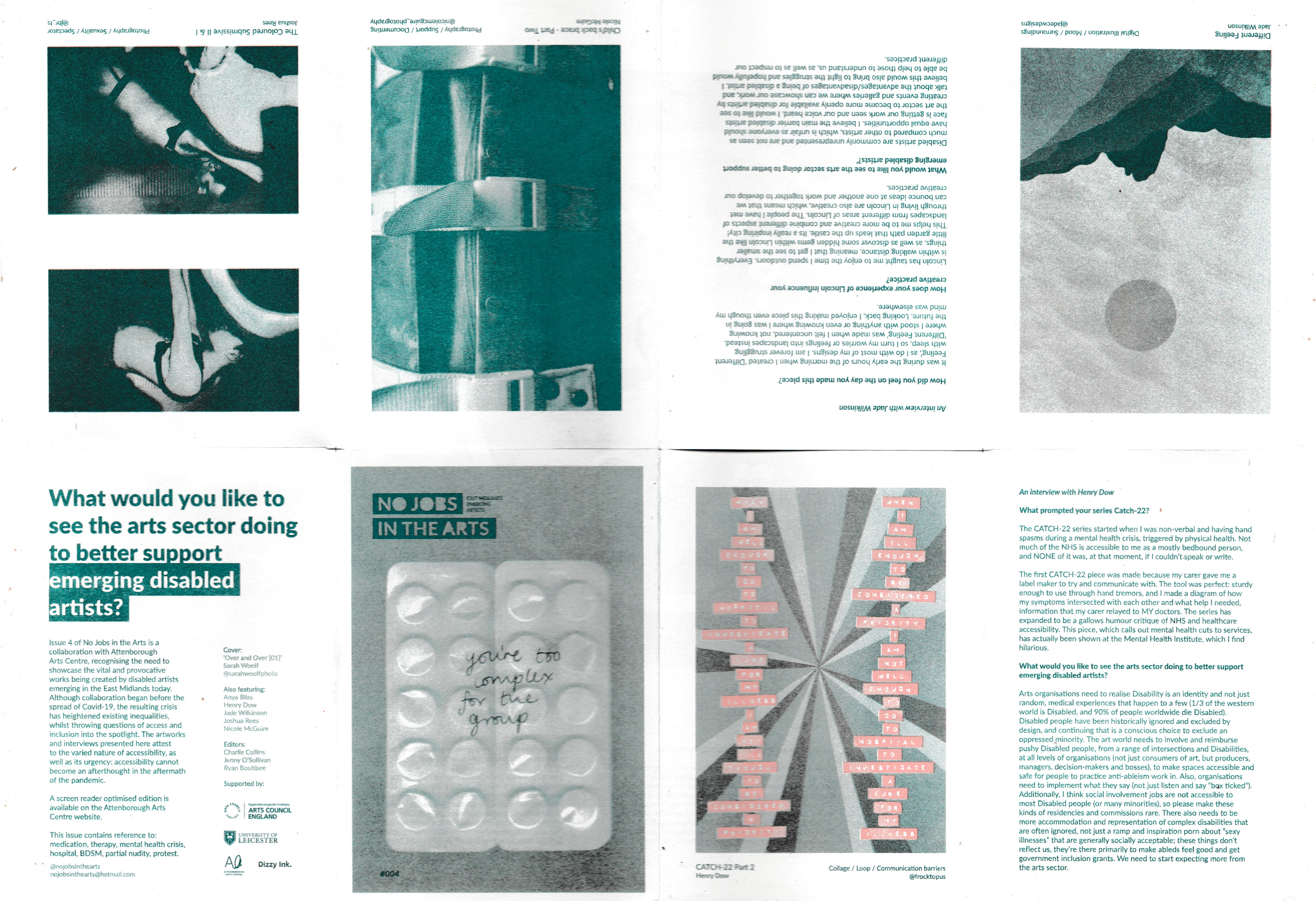No Jobs in the Arts
Interview by David McLeavy
-
Published in July 2021
-
No Jobs in the Arts (NJITA) is run by Charlie Collins (CC) and Ryan Boultbee (RB) aimed at creating professional development opportunities for early-career creatives working in the Visual Arts, through projects linked to the East Midlands.
-
 #2, showcasing emerging and young artists in the East Midlands. Front and back covers. 2019. 105 x 148 mm. Artwork by Theadora Prassa.
#2, showcasing emerging and young artists in the East Midlands. Front and back covers. 2019. 105 x 148 mm. Artwork by Theadora Prassa.Hi Charlie and Ryan. I think it’s important to do a little bit of scene setting before we delve in. I wondered if you could talk about how No Jobs in the Arts (NJITA) came about and how you functioned at the start of your journey?
RB: In its current form, NJITA addresses a lack of professional development opportunities in the Visual Arts. We create opportunities for early-career creatives to gain experience and showcase what they do best. These opportunities make up our programme of increasingly ambitious creative projects, all linked to our region, the East Midlands. We’ve been learning on-the-job together running NJITA, since 2019; our collaborative practice started off with a zine. Did I miss anything off, Charlie?
CC: I think that pretty much covers where we’re at now! As you said, our collaboration started out with making a zine together. We actually met via email - after Ryan came across the open call for Issue #1 of NJITA’s first zine; he got in contact with me and said he was ‘a tad curious’ how the project had turned out. We got talking and decided to work together to produce Issue #2 of the zine.
Although our main focus at that point was creating the zine, we started pushing to connect with local galleries and organisations straight away, sending copies of Issue #2 all over the East Midlands. We wanted to get emerging artists into as many venues as we possibly could. Since we’re both from the region it’s always been really important for us to connect with the local industry, but I think it became clear to us just how important that network was after launching #2. The support and encouragement of the zine and our featured artists was really lovely!
 #3, working with artists from the University of Northampton. Pull out poster. 2020. 420 x 297mm. Artwork by Allegra Fanti.
#3, working with artists from the University of Northampton. Pull out poster. 2020. 420 x 297mm. Artwork by Allegra Fanti.That feels like a very natural way that your collaboration started! I am curious to know what sort of professional development opportunities you initially had in mind during the early stages of NJITA and whether what you offer now, or what you are now seeking to offer, differs from that original type of support?
RB: With our events, publications, exhibitions, and other creative opportunities, we want to create a leg-up for people working in the visual arts - an alternative way to gain local experience, by being involved in ambitious creative projects. That offer has not changed. However, the way we work has shifted to a more collaborative approach: a way of working that supports the sharing of knowledge and learning experiences.
CC: Yeah, and I think that approach became apparent to us whilst working on Issue #3 and #4 of the NJITA zine. They were the first projects in which we brought in external voices to co-curate the publications, and just like mine and Ryan’s collaboration, both projects felt like very shared learning experiences. We realised it wasn’t just about the support we offered to the artists featured in the zine, but the support and learning we could offer the creatives working behind the scenes with us.
We’re both aware that, being emerging artists ourselves, we have a limited amount of experience and knowledge to share. But, with every project and collaborator we work with, we learn new skills and we’re really keen to share this, allowing that learning to benefit others. I think that’s where our idea of support and mentoring comes from, simply passing on the skills and knowledge we’re gaining as we build up NJITA.
 #4, surveying emerging disabled artists in the East Midlands, in collaberation with Attenborough Arts Centre. A3 unfolded publication. 2021
#4, surveying emerging disabled artists in the East Midlands, in collaberation with Attenborough Arts Centre. A3 unfolded publication. 2021I really like the honesty and openness about you both also being in the early stages of your careers, and embracing the learning that happens through developing these projects.
I want to discuss a little more about the various projects that you have developed and delivered since starting NJITA. I wonder if it would be useful for you to take me through some of the stand out projects that help define what NJITA is now.
CC: For me, one of our standout projects has to be Issue #4 of NJITA, which featured disabled artists from the region. We created the issue in collaboration with Attenborough Art Centre, a gallery in Leicester, focusing on accessibility, and working directly with their assistant curator, Jenny O’Sullivan.
Working with Jenny brought a completely new curatorial perspective to the project, as well as different skills and knowledge, which allowed us to explore themes that we had less experience with. We were able to think way beyond just creating a publication. We started thinking about the bigger picture: how we communicate with artists, the support we could offer them throughout the creation of the zine, and how accessible the output could be to an audience. In the end we ended up creating three versions of the zine: a limited edition run of paper copies, an interactive pdf, and a screen reader friendly transcript.
Through this process we were able to learn so much about how accessible our work could be; we’ve been trying to feed that learning directly into every project we’ve delivered since. It has highlighted to us how important collaboration is, and, I’d say, we now go into each new project and collaboration with an open attitude: ready to learn, challenge our methods, and try new ways of working.
RB: As Charlie has said, we use zine making as a form of research; what we make in collaboration with others marks a starting point, or helps us to map a curatorial theme, inspiring other projects in our programme. For example, Issue #5, a survey of creatives practicing during the lockdown, inspired a festival, exhibitions, workshops, talks, and interviews. Today, I’d say our Introducing interview series best describes NJITA: simple, but reflective. You can read them on our instagram (@nojobsinthearts).
 #5, surveying early-career creatives in Leicestershire. Cover and pullout. 2021. Artwork by Hannah Sarah Day and Danielle Vaughan.
#5, surveying early-career creatives in Leicestershire. Cover and pullout. 2021. Artwork by Hannah Sarah Day and Danielle Vaughan.That leads me nicely to my next question which is around the pandemic. What strikes me as particularly unique about NJITA is that it started as an online focused programme, which developed into some in person delivery, therefore I am wondering how the pandemic has changed the way you think about programming and if you have any examples of ways you have shifted the way you support artists as a result of this?
RB: This year, we tried to create new opportunities for creatives that wouldn’t be cancelled - or indefinitely postponed - due to COVID-19. Throughout the year, we’ve been exploring ways to support artists through our programme, working creatively with digital resources to navigate restrictions. For example, during a recent online exhibition, In Residence, produced in collaboration with Attenborough Arts Centre, we commissioned artists to spend one day making at home: a lockdown residency. I think our approach to programming is now abit more adaptive, focusing on how we can support artists and curators during professional development opportunities.
CC: I agree. I think by focusing on what happens behind the scenes, rather than exclusively the outcome, this really allows us to focus that support. We want to make sure that our projects offer real development opportunities for artists, and that this happens in each stage of the project; throughout the research; production; facilitation and launch. As well as this, it’s had an impact on how we explore the East Midlands art network and discover new artists, and I think through projects like our zine and digital Fringe Festival, we’re starting to develop new ways of connecting and collaborating.
-
nojobsinthearts.co.uk
@nojobsinthearts
-
If you like this why not read our interview with Gary Zhexi Zhang.
-
© YAC | Young Artists in Conversation ALL RIGHTS RESERVED
